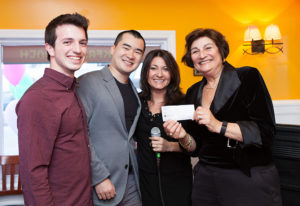
For Jessica Horton ’17, the straightforward course title, Community and Health: Nonprofit Grantmaking, hardly hinted at the immersive experience to come. Throughout the fall semester, Horton and her classmates researched, wrote and pitched grant proposals on behalf of several Worcester nonprofit health organizations that address health and social disparities among underserved populations.
But the most demanding, and wrenching, element for the students was deciding which organizations would receive funding, and which would not.
“I didn’t know it would be this intense. We were emotionally invested.”
Jessica Horton ’17
The course, designed by Rosalie Torres Stone, associate professor of sociology at Clark University, gave undergraduate students the opportunity to understand the social and economic underpinnings of philanthropy in the nonprofit sector. She secured $15,000 in funding — $5,000 each from the Learning By Giving Foundation, the Greater Worcester Community Foundation, and the Mosakowski Institute for Public Enterprise at Clark University. The class was divided into four groups, with each group assigned to work with a local nonprofit health organization in Worcester to develop a grant proposal then defend it to their fellow students, who collectively decided how the funding would be distributed. Ultimately, $10,000 was awarded to LAHA Hector Reyes House, which provides residential substance abuse treatment for Hispanic men, and $5,000 went to Pernet Family Health, which offers health and other services to the surrounding community.
Horton’s group collaborated with Hector Reyes House at a time when the organization was launching a major new initiative in which some of the residents work at Café Reyes, a Cuban restaurant where they prepare and serve mouthwatering sandwiches and other fare in a small but vibrant space on Worcester’s Shrewsbury Street. The men are former addicts, some of them ex-cons, who are making the slow, steady climb toward recovery, with their restaurant employment supplying an opportunity to learn a trade as well as the “soft” skills needed to maintain a healthy, productive lifestyle while transitioning into the workforce.
Horton and fellow students Donovan Snyder ’17 and Jiawei Mao ’15 made site visits to Hector Reyes House and fashioned their proposal with the input of Executive Director Dr. Matilde (Mattie) Castiel.
“We saw the kind of social capital Mattie had in the Latino community and how important she is in their lives,” Horton recalls. “She wants these men to succeed so much that she created an environment where success is possible.”
Horton’s group spent time with the men, hearing their stories of difficult lives marked by drug and alcohol abuse.
“They talked a lot about the remorse they felt for failing their kids and failing their wives and girlfriends,” Horton says. “Many of them have hopes of staying clean and rebuilding the relationship with their families.”
Torres Stone says the course achieved a number of goals. It gave students a rich understanding of the dynamics of a nonprofit, provided an opportunity to conduct community-based health research, and immersed them in the grant-writing and review process. As Horton notes, perhaps the toughest lesson of all was choosing who would benefit from a limited funding pool when all the recipients were deserving.
“The kids found it was much more difficult to make the decision in the end,” says Torres Stone. “They were pretty torn about it — they wanted to fund all four proposals.”
Torres Stone is offering the course again this fall.
Horton was inspired enough to intern this summer at the Learning By Giving Foundation, and is eyeing nonprofit work as a possible career choice. “Nonprofits fill the gap where social service programs end,” she says. “They fill a need where something is faltering.”
